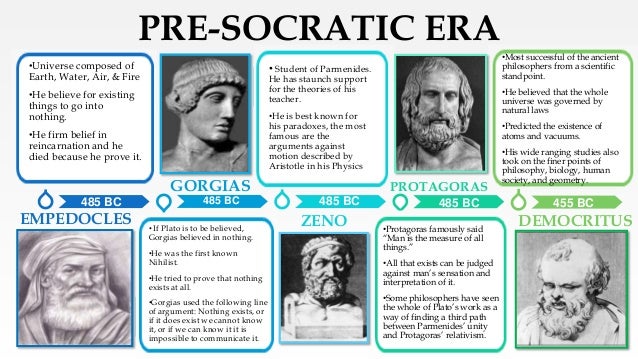Note: All posts are interconnected, so you are requested to read the previous posts before reading this post.
The last post discussed the materialistic worldview - full of inherent contradictions and dilemmas. If you have not gone through it yet, read the previous post before reading this section, as all posts are interconnected. It is important to note here that the materialistic worldview that has influenced the globe and is being adopted worldwide, irrespective of the religion, cast, creed and even geographical area, did not even exist before the fourth century B.C. In fact, interestingly, it was quite the opposite those days. The then philosophers are known as Pre-Socrates Philosophers. It will be an exciting journey to learn about their worldviews because many of us, especially those who are born in the modern era full of materialistic happiness, may not be able to think of worldviews other than the materialistic. This section unfolds the worldviews of the Pre-Socrates Philosophers, which were not materialistic at all.
Thales, Anaximander and Anaximenes, who lived in Miletus
city in Greek in the sixth century B.C., are
considered the ancestors of philosophies in western civilization. They were
curious to know about the Universe and its fundamental substances. Therefore, questions
like who created the Universe, how does the Universe work? etc., were at their
priority. They tried to understand the Universe from the point of view of inherent
natural laws rather than any God’s action or supreme power. So, they are often
called ‘naturalists’ or ‘cosmologists’.
They observed two fundamental characteristics of
reality: first, everything in the world is changing with time: second, any
single thing that exists is different than anything else that exists, has
existed and will ever exist. They concluded that a single and permanent
substance underlying all the dynamic changes occurring in the perceptible world
retains its unity and fundamental identity, termed as ‘Arche’. The Milesians
saw the Arche as a physical or bodily material, as opposed to the concept of an
immaterial soul or pure intellect. However, at the same time, this underlying
essence was regarded as alive and endowed with spirit, and it was deemed divine
and imbued with intelligence. Each Milesian offered a different view about what
the Arche is made of. For example, Thales proposed that Arche is made of water,
which implies water is an underlying substance of everything. Empedocles (fifth
century B.C.) claimed that the combination of four elements (earth, water, air,
and fire (or light) is the root cause of all the manifestation in the material
world. Anaximander believed Arche not to be any material substance because of its
limited nature. So, he called Arche as ‘Aperion’ -something is absent of limitations
or limitless- which implies all-pervading. Anaximenes proposed Arche as ‘Air’. From
an atomistic perspective, Democritus, half a century after Empedocles,
visualized the material world as composed of atoms of various shapes and sizes.
He believed that all the observable dynamic properties are the combinations of
atoms inside the objects. Epicurus, who extended the teaching of Democritus,
restated the atomic perspective and said that whatever exists results from the recombination
of atoms.
There was another view about the Universe based on the
analogy of ‘Microcosm’ and ‘Macrocosm’. For earlier Greek philosophers, the
world was a kosmos- ultimately ordered and harmonious structure which implies
that each unit of this world is in harmony placed purposefully with other parts,
and the characteristics of the whole Universe reflect on its parts. Microcosm
and macrocosm are two components of an ancient Greek philosophical theory that
describes humans and their role in the Universe. These early thinkers
considered the individual human being as a small world (mikros kosmos ), whose
composition and structure matched that of the Universe, or big world (makros
kosmos, or megas kosmos ). This can be understood from Philebus and Timaeus, where
Plato argues that humans and the Universe both have a fundamental body and a rational
soul. The human soul must derive from the Universe’s soul, just as the human
body does from the Universe’s body. As a result, the cosmos is not only a
well-ordered system but also an intelligent creature.
The above discussion implies that the earlier Greek
philosophers used to think of inherent unity, the interconnectedness of various
parts of the Universe, the proper role of various substances, orderliness and
purposeful integration of all substances. They were more interested to know the
inherent underlying natural laws of which the whole world is a manifestation. This
kind of worldview prevailed during the pre-Socrates period when philosophers used
to explore wholeness and its parts with their roles.
NOTE: Kindly comment if you have any input to improve the post. Click on Follow to get the latest updates.

No comments:
Post a Comment